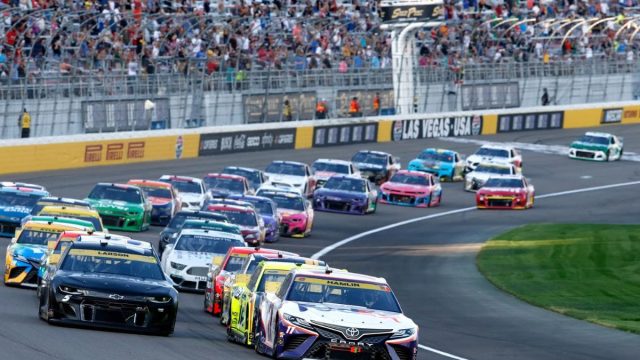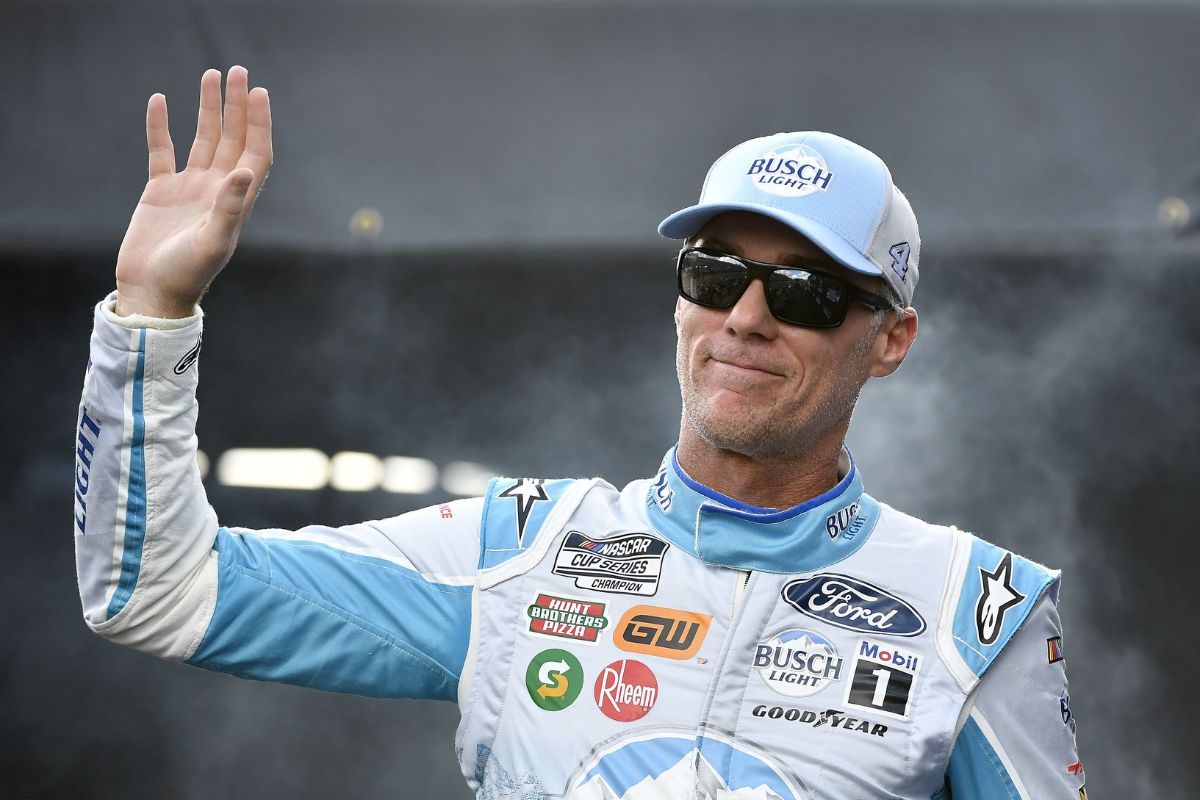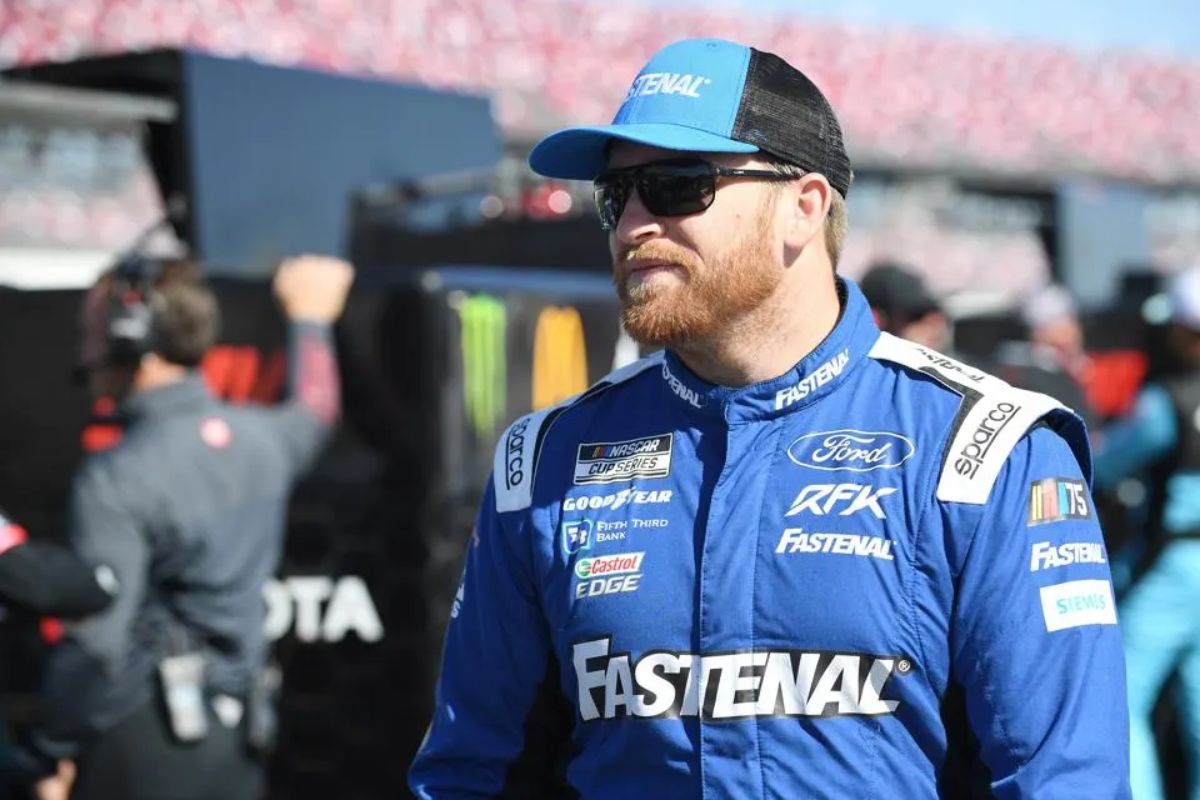Top 5 Luckiest NASCAR Wins: In NASCAR, the line between victory and defeat often blurs in the face of sheer unpredictability. From weather-induced chaos to strategic gambles, luck wields immense power over the sport’s outcomes. Iconic moments, like Ross Chastain‘s daring wall ride or Kevin Harvick‘s last-minute triumph, show how fortune and skill collide dramatically. Whether it’s Chris Buescher navigating fog at Pocono or Chase Elliott capitalizing on a post-race shuffle, these instances underscore the essence of NASCAR’s thrilling unpredictability. As fans and drivers alike know, in this high-speed arena, luck isn’t just a factor—it’s a game-changer.
Key Highlights
- NASCAR races are shaped by a mix of driver skill, strategy, and unpredictable elements like weather and mechanical issues.
- Moments like Ross Chastain’s “Martinsville Miracle” show how a single stroke of luck can transform a race.
- Kevin Harvick’s 2011 Coca-Cola 600 victory highlights how luck, combined with tactical skill, can lead to unexpected wins.
- Chris Buescher’s 2016 Pocono win demonstrates how weather and strategic pit stops can intertwine to produce surprising results.
- James Buescher’s 2012 Daytona win and Chase Elliott’s 2022 Pocono victory reveal how luck can redefine outcomes in NASCAR.
Luck in NASCAR
Luck plays a vital role in NASCAR, often intertwining with driver skill and strategy to shape the unpredictable outcomes of races. While skilled drivers carefully prepare their vehicles and execute precise tactics, the inherent unpredictability of racing can introduce elements that defy even the most calculated plans.
Incidents such as unexpected weather changes, mechanical failures, and the behavior of competitors can dramatically influence race results, emphasizing how luck can be both a friend and a foe.
Take, for instance, the case of Ross Chastain’s remarkable “Martinsville Miracle.” His audacious wall-ride action not only propelled him into contention but also demonstrated how a single moment of luck, coupled with daring decision-making, can alter the path of a race. However, the subsequent ban on this move by NASCAR further highlights the transient nature of luck within the sport, as strategies that once offered success may quickly become obsolete.
Moreover, the role of luck extends beyond individual races; it permeates entire seasons. A driver may find themselves benefiting from a series of fortunate events, such as advantageous cautions or rival misfortunes, which can cumulatively lead to a championship victory.
Conversely, a lack of luck can derail even the most talented drivers, leading to missed opportunities and disappointing finishes. In NASCAR, where the margin for error is razor-thin, the interplay of luck and skill creates a rich tapestry of narratives that captivates fans and participants similarly.
Kevin Harvick – 2011
In a dramatic turn of events during the 2011 Coca-Cola 600, Kevin Harvick capitalized on a critical misfortune faced by Dale Earnhardt Jr., transforming a challenging starting position into an unexpected victory. Harvick, piloting the No. 29 Chevrolet for Richard Childress Racing, had endured an unimpressive qualifying session that left him starting in 28th place. This dismal position, however, did not deter his competitive spirit or tactical skill.
As the race unfolded, Harvick methodically navigated through the field, demonstrating exceptional racecraft and patience. His ability to avoid accidents and capitalize on pit strategy allowed him to remain in the running as the laps dwindled. With just one lap remaining, the stage was set for a dramatic finish. Earnhardt Jr. was leading, seemingly on the verge of breaking a lengthy winless streak, when disaster struck—he ran out of fuel.
This moment of fate allowed Harvick to seize the opportunity that few could have anticipated. As he surged ahead to claim victory, the narrative of luck intertwined with skill became evident. Harvick’s success was not merely a product of chance; it highlighted the importance of persistence and adaptability in motorsport.
Ultimately, the 2011 Coca-Cola 600 serves as a compelling reminder that in NASCAR, fortunes can shift in an instant, and tactical execution can transform adversity into success. Harvick’s victory remains a reflection of the unpredictable nature of racing, where preparation meets opportunity at the most crucial crossroads.
Chris Buescher – 2016
Amidst a race marked by unpredictable weather conditions and tactical moves, Chris Buescher’s unexpected victory in the 2016 Pennsylvania 400 at Pocono Raceway emphasized the delicate balance between seizing opportunity and steering through the whims of fate. Starting from P22, Buescher’s ascent through the field was both methodical and opportunistic, showcasing his ability to capitalize on the calculated missteps of others.
The race was greatly impacted by fog that obscured visibility, resulting in a caution with 29 laps remaining. NASCAR regulations allow a race to be concluded after surpassing the halfway point due to adverse conditions, and as the race unfolded, the weather played a crucial role in determining the outcome. With 22 laps to go, the race was red-flagged, and Buescher, who found himself leading the pack due to skillful management of his pit strategy, was ultimately declared the winner.
Buescher’s success at Pocono serves as a compelling case study in the interplay of chance and strategy within NASCAR, highlighting that fortune can indeed favor the prepared. This win, while enveloped in controversy, stands as a proof of the unpredictable nature of motorsport.
Mark Martin – 2009
While Chris Buescher’s success in the 2016 Pennsylvania 400 illustrated the unpredictable nature of NASCAR, Mark Martin’s victory in the 2009 LifeLock 400 at Michigan International Speedway exemplified how tactical positioning and the misfortunes of competitors can dramatically alter the outcome of a race. In a sport often defined by its fast-paced action, Martin’s success was a masterclass in tactical foresight and opportunism.
Entering the final laps, Martin was positioned in third place, a seemingly precarious position given the dynamics of the race. However, as fate would have it, Jimmie Johnson, who was ahead, encountered fuel issues, forcing him to relinquish his lead. This created a wave effect, setting the stage for Martin’s decisive action. Meanwhile, Gregg Biffle, who had been leading comfortably, began to struggle with his own fuel concerns, visibly losing control of his vehicle.
With half a lap remaining, Martin seized the moment. His experience and intuition allowed him to navigate the chaos, executing a timely overtaking tactic on Biffle. This not only highlighted Martin’s racing expertise but also emphasized the importance of being in the right place at the right time.
His victory was not merely a product of luck; it was a reflection of the tactical mastery inherent in NASCAR racing. In the end, Martin’s ability to capitalize on the misfortunes of others culminated in a well-deserved success, cementing his legacy in the annals of the sport.
James Buescher – 2012, Chase Elliott – 2022
James Buescher’s unexpected success in the 2012 Daytona 300 and Chase Elliott’s controversial win at Pocono Raceway in 2022 both highlight the unpredictable twists of fortune that can define NASCAR racing, where skillful navigation of chaos often determines the outcome. These moments encapsulate the essence of luck interwoven with strategy, as both drivers found themselves in extraordinary circumstances that led to their victories.
| Driver | Year | Circumstances Leading to Victory |
|---|---|---|
| James Buescher | 2012 | Avoided an eleven-car wreck on the final lap, seizing the lead. |
| Chase Elliott | 2022 | Initially finished P3; declared winner post-race due to disqualifications of competitors. |
Buescher’s success at Daytona came as he deftly maneuvered through an unpredictable melee, showcasing not only his driving expertise but also the inherent chaos of superspeedway racing. Conversely, Elliott’s win at Pocono was rooted in regulatory scrutiny, an unprecedented disqualification that shifted the winner’s circle. Both instances reflect the dual nature of luck and skill in NASCAR.
Chase Elliott WINS at Pocono!
Denny Hamlin and Kyle Busch were originally in first and second, but both failed post-race inspection. #NASCAR pic.twitter.com/hC612D7C5D
— NASCAR on NBC (@NASCARonNBC) July 25, 2022
Ultimately, these victories serve as reminders that in the world of NASCAR, the intersection of chance and strategy can yield extraordinary results. While both Buescher and Elliott exhibited skill, it was the fortuitous circumstances of their respective races that propelled them into the limelight, revealing the unpredictable nature of competitive motorsport.
News in Brief: Top 5 Luckiest NASCAR Wins
The unpredictable nature of NASCAR racing often leads to remarkable victories shaped by sheer luck.
Instances such as Kevin Harvick’s 2007 Daytona 500 win or Chris Buescher’s fog-affected 2016 Pennsylvania 400 highlight how fortune can dramatically alter race outcomes.
These moments not only captivate fans but also emphasize the intricate relationship between strategy and chance within the sport.
Ultimately, the element of luck remains an enduring component of NASCAR, contributing to its thrilling unpredictability and allure.
ALSO READ: Kevin Harvick Juggles Retirement Plans and Son Keelan’s Racing Ambitions







